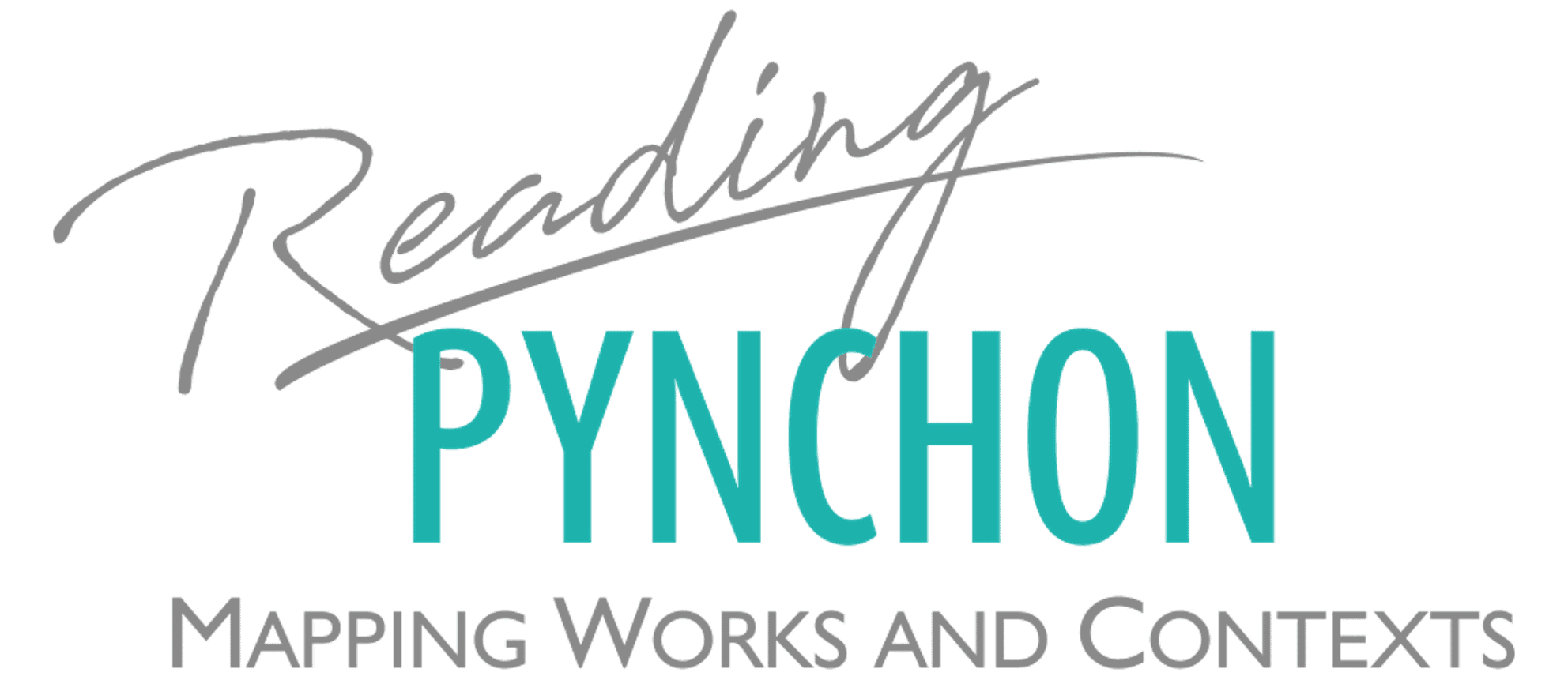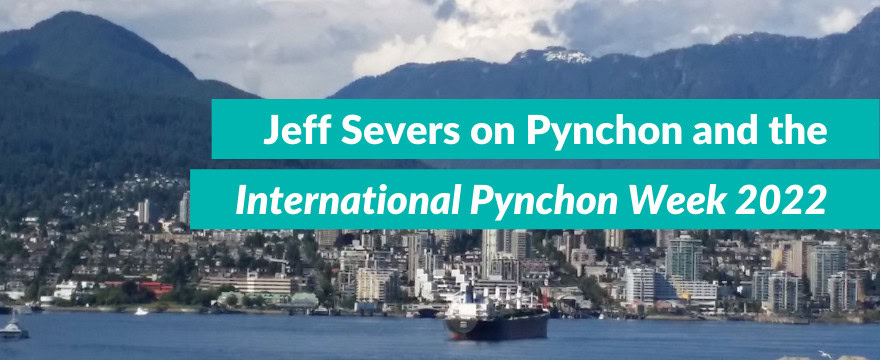[Pynchon has] defined for me, especially in Gravity’s Rainbow, what a novel can do, what ‘the point’ of deep, sustained attention to a long fiction can be.
Jeff Severs
The organizer of the International Pynchon Week: a “good Pynchonian”!
Jeffrey Severs, who organizes the 2022 International Pynchon Week (IPW) in Vancouver, BC, Canada, grew up and studied in the USA and received his Ph. D. from Harvard University. He has been part of the faculty of The University of British Columbia (UBC) in Vancouver, BC, Canada since 2009 and Associate Professor at UBC since 2016. His research is primarily focused on postmodern and contemporary U.S. literature and culture, mainly focusing on Thomas Pynchon, David Foster Wallace, and John Edgar Wideman (cf. Severs 2022a).
Among numerous essays and articles (cf. Severs 2022b), together with Christopher Leise, Severs has edited Pynchon’s Against the Day: A Corrupted Pilgrim’s Guide (2011) and contributed Chapter 24 to Pynchon in Context: “Capitalism and Class” (Severs 2019).
Jeff Severs on Pynchon and organizing the IPW 2022
In April 2022 Jeff Severs, this year’s organizer of the International Pynchon Week, answered my questions concerning his personal experiences with Pynchon’s novels. Three years ago Umberto Rossi and Paolo Simonetti, the organizers of the IPW 2019, had already been so kind to answer questions on “their” Pynchon and the Pynchon conference in Rome.
The questions I asked this year are the same as those to Rossi & Simonetti in 2019, for simplicity’s and tradition’s sake – almost the same since I added one more question due to the new hybrid format of the IPW in Vancouver, BC in June 2022.
Two interviews (2019 and 2022) might be enough to establish a tradition. Therefore, I am more than grateful that Jeff Severs also handed in a photo of his with “Pynchon” (see below) and more than grateful for him taking his time amidst organizing the IPW and his daily tasks to answer all my interview questions!
Read the interview and feel free to tell us about your first Pynchon novel and your personal interests in Pynchon by replying at the end of this blog post!
Interview with Jeff Severs
Reading Pynchon: What was the first Pynchon novel you read?
Jeff Severs: The Crying of Lot 49, back when I was about 20 years old.
Reading Pynchon: Please tell us about your experiences with your first Pynchon novel.
Jeff Severs: In answering the first question I realized I have a maybe more complicated “first” story perhaps common to Pynchon readers: I remember buying a remaindered Vineland in the early 1990s while in high school (I think there were a lot of remaindered copies of Vineland in bookstores then), reading maybe 25 pages of it, and putting it aside. I had no real idea who Pynchon was. Then two or three years later I read Lot 49 as my reading taste was really maturing at college, though I’m not even sure I made any connection between it and Zoyd Wheeler and Vineland. But I only really “got” (or started to get) Pynchon when about a year after Lot 49 I was able to spend much of a summer (1995) reading Gravity’s Rainbow (GR) little by little, maybe 30 or 40 pages a day – and then writing a senior college thesis on it the following school year. That was after a start/stop with GR, months earlier, when I was too busy to give it sustained attention (so like many before and after me I got maybe 100 pages in and lost the thread). Getting to the end, piecing together the mysteries of GR, trying to write about a few of them, starting in on the criticism – that was where my fascination with Pynchon really began, and he’s been close to the center of my mind most years since.
He’s also just so much fun: in first reading GR and other Pynchon novels that summer I laughed a lot.
Jeff Severs 2022
Reading Pynchon: What do Pynchon’s novels mean to you?
Jeff Severs: Well, at or “close to the center of my mind” pretty much captures it. He’s defined for me, especially in GR, what a novel can do, what “the point” of deep, sustained attention to a long fiction can be. In grad school I tried working on earlier U. S. literature but ultimately couldn’t stay away from TRP. He’s also just so much fun: in first reading GR and other Pynchon novels that summer I laughed a lot. When Benny Profane undoes the screw in his navel and his ass falls off, or when Stephen Dodson-Truck says to Slothrop, “Go ahead hit me. I’ll only fall over and bounce right up again. Watch,” and the next sentence is “He demonstrates” – those are scenes that made me giggle, made me read them aloud to housemates. I’m making myself nostalgic for my very early twenties here.
Reading Pynchon: Which Pynchon novel or short story is your most favorite one today? Please, explain why.
Jeff Severs: I love them all in their own way, like any good Pynchonian, but I’ll always have a soft spot for Vineland, the least-loved (for a while – that’s changing) and remaindered child. That’s probably because, too, I published my first article ever on Vineland – based on a paper I gave, in fact, at my very first IPW, in 2006 in Granada, Spain, a wonderful conference organized by Celia Wallhead [cf. Severs 2009].
Reading Pynchon: What aspect of Pynchon’s literary work are you most interested in?
Jeff Severs: That article on Vineland and much else in the dissertation it was part of concerned prophecies of the U. S. going totalitarian. And that remains the most important project of Pynchon’s work, I think, especially in the first four novels: his aim of forestalling fascism taking over in ostensible democracies. “Werewolf season” is one image for it, in V. The last five or six years in the U. S. (I live in Canada but grew up in the States), those prophecies and alarms have seemed all the more correct and important, of course.
Reading Pynchon: If you had the time and means to write a (new) book on Pynchon – what aspect of his works would you focus on?
Jeff Severs: Oh, goodness, I probably should dust off that dissertation and revise it, or should have done so five years ago, as Trump was getting his claws in. It was also about DeLillo, Mailer, John Edgar Wideman, and I added later work on Philip Roth’s The Plot Against America. But really the true answer here is I have three or four Pynchon-centered book ideas, which is maybe why no single one gets written.
Reading Pynchon: Please tell us about your hopes and expectations for the International Pynchon Week 2022 in Vancouver, BC.
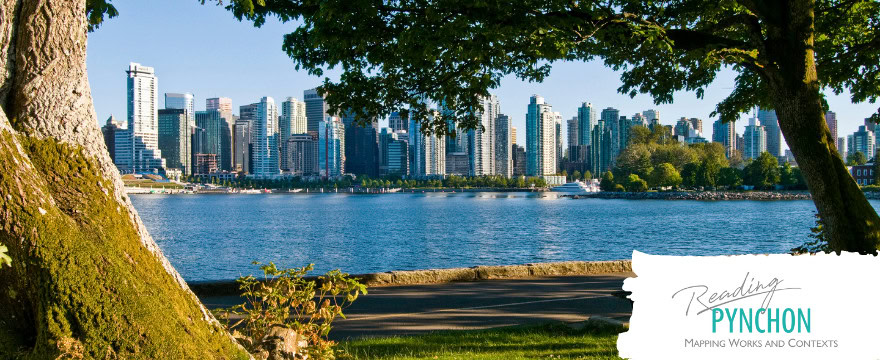
Jeff Severs: I know it will be intellectually formidable, with lots of great papers, and I hope it will be an especially fun and convivial IPW – there are always a lot of old friendships to renew (and new ones to make), and that’s all the more meaningful amid the pandemic. I’m excited as well to host special guest Jim Gavin, the creator of the Pynchon-inspired, Southern California-set TV show that everyone should watch, Lodge 49. I like criticism a lot but also love hearing about artists travelling into their own dimensions with Pynchon as guide. I’m also eager to show off the UBC campus and the beautiful city of Vancouver to visitors – especially when we have sunny skies here (fingers crossed for that in June), it’s such a gorgeous place.
Reading Pynchon: Contributors to the International Pynchon Week this year cover a wide variety of topics. In what sense do the contributions offer new insights into Pynchon or new readings of Pynchon’s works?
Jeff Severs: We’ll have to hear the papers! Thirty-six very intriguing titles – go to the conference program to see them all and get ready. But one thing I’ve been intrigued by in putting the schedule together is the degree to which the “center” of new work on Pynchon, if there is a center, has thoroughly shifted toward Mason & Dixon and after, with far fewer papers now on the works up to 1990. It’s certainly to be expected, since we’ve had so much new work to feed so many new and intriguing critical agendas. But I remember, at my first IPW in summer 2006, hearing one morning in the conference hall from people on the right email lists (like my friends Sascha Pöhlmann and Chris Leise), that a new novel was coming that fall – Against the Day. (A few years later Chris and I would collaborate on a collection of essays on that novel.) Gravity’s Rainbow won’t be the center of things in 2022 in the way it still pretty much was in 2006, where I was thrilled and intimidated to hear from and have drinks with luminaries who founded Pynchon studies with arguments centered on the early works, like Steven Weisenburger and Tom Schaub. But a focus on later Pynchon will probably change again, too, at least for a while, once we get to 2023 and GR turns fifty.

Reading Pynchon: During the pandemic we got accustomed to events being streamed live. The IPW 2022 will offer a hybrid format – live streaming and in-person panels. In what way are you looking forward to this new way of holding the IPW?
Jeff Severs: I’m just looking forward to all the technology working smoothly! Fingers crossed there too. But more seriously, I’m glad that we have increased access – for the nine remote presenters and of course the many more who will be able to attend an IPW (and ask questions of speakers) without all the worry and cost of travel. I imagine it will all be bigger and better than the June 2021 one-day online symposium I organized, which was all done remotely and went really well.
Reading Pynchon: Could you tell us about your experiences when organizing the International Pynchon Week?
Jeff Severs: I’ve found I don’t take naturally to conference organizing (I’m not sure many academics do), and while the more intellectual aspects of it (a call for papers, grouping presenters, and so on) are easier and fun for me, I feel at times with logistics like the person who’s never hosted a dinner party suddenly having 40 or 50 people over for dinner. For four days and nights! (Speaking of parties, look out for fascinating papers at IPW 2022 on that subject in Pynchon by the critics Jennifer and Russell Backman – sibling Pynchonians.) Of course there’s also been a lot to worry about with the pandemic and global travel for presenters. But I’ve had really great support, I know it will all come off smoothly, and I’m looking way forward to it. Pynchonians are the best people, and IPWs are the most egalitarian, most collegial conferences I’ve been a part of. I doubt this one will be any different.
Reading Pynchon: Where will the next International Pynchon Week take place?
Jeff Severs: We’ll have a “Future Pynchon Conferences” roundtable at this IPW, the morning of Thursday, June 9, as the program notes. The answer to this question will start to emerge there, I think, so attend or tune into Zoom then.
Reading Pynchon: Thanks a lot for the interview!
What is your “Pynchon Story”?
What is the first Pynchon novel or short story you read? What does Pynchon mean to you? Feel free to use the comment section below to share your experiences!
More on International Pynchon Weeks
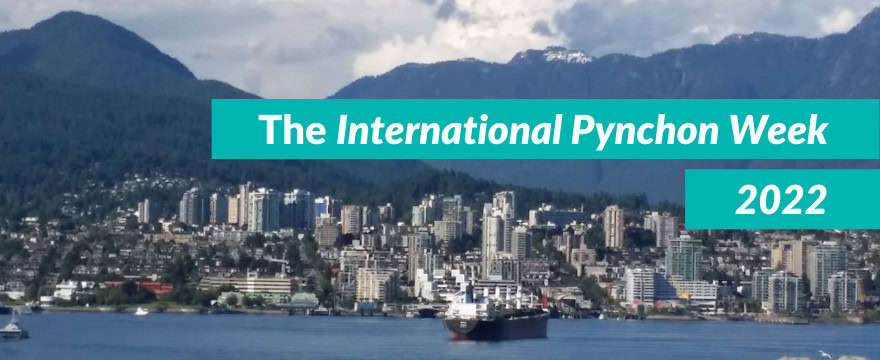
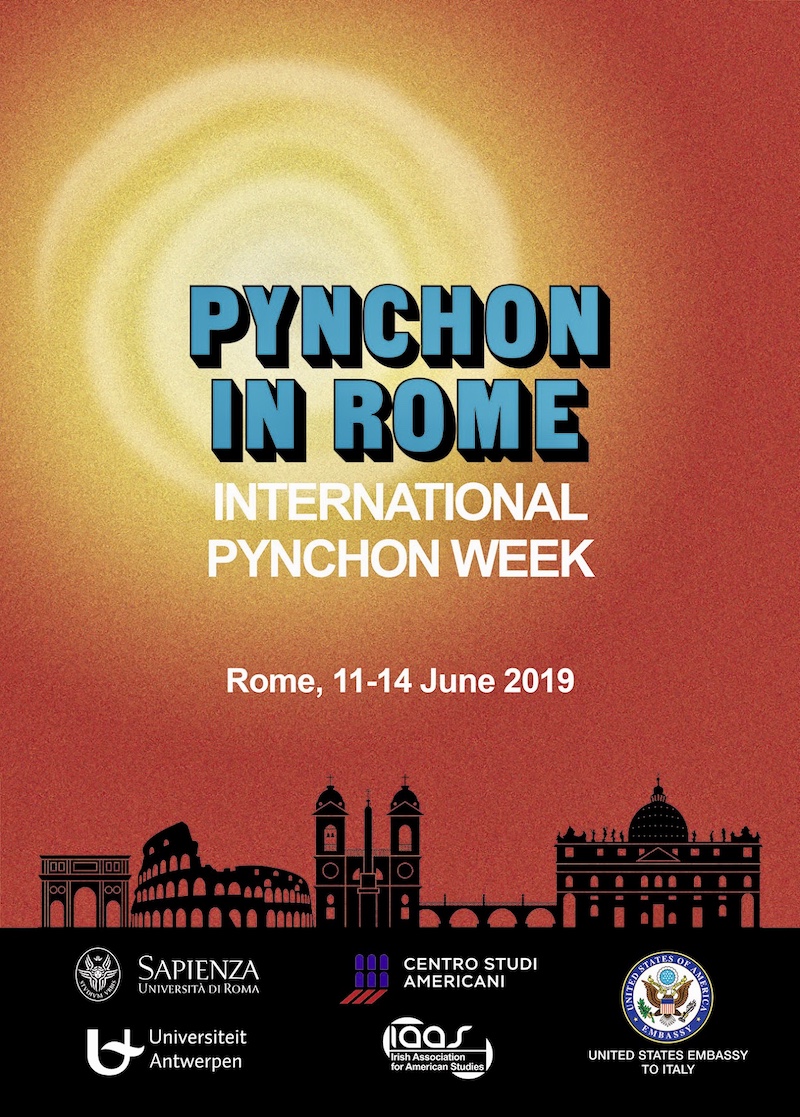

Read the following blog articles on International Pynchon Weeks:
- Preview to the IPW 2019 in Rome: Which topics were covered in 2019? See my blog article on the pre-pandemic International Pynchon Week 2019!
- Interview with the organizers: Get to know the 2019 organizers of the IPW in Rome: Umberto Rossi and Paolo Simonetti answer questions on their Pynchon experience and the 2019 conference.
- Preview to the IPW 2022 in Vancouver, BC, Canada, in which I summarize possible topics for the conference.
Further Reading
- Inger H. Dalsgaard (ed.; 2019). Thomas Pynchon in Context, Cambridge: Cambridge University Press.
- Christopher Leise and Jeffrey Severs (ed.; 2011). Pynchon’s Against the Day: A Corrupted Pilgrim’s Guide, Newark: University of Delaware Press.
- Jeffrey Severs (2022a). “About”, on: The University of British Columbia. Department of English Language and Literatures, URL: https://english.ubc.ca/profile/jeffrey-severs/ (Last access: April 20, 2022).
- Jeffrey Severs (2022b). “Research & Publications”, on: Jeffrey Severs. Jeffrey Severs. Associate Professor, Department of English, University of British Columbia, URL: https://jeffreysevers.wordpress.com/publications/ (Last access: April 20, 2022).
- Jeffrey Severs (2019). “Capitalism and Class”, in: Inger H. Dalsgaard (ed.). Thomas Pynchon in Context, Cambridge: Cambridge University Press, 195-201.
- Jeffrey Severs (2009). “In Fascism’s Footprint: The History of ‘Creeping’ and Vineland‘s Poetics of Betrayal”, Pynchon Notes 56-57 (Spring-Fall), 212-228.
Credits
- Featured image: Skyline of Vancouver, BC, Canada © Rosalie Magistro (via Canva); Utz Klöppelt – Reading Pynchon.
- Vancouver on a sunny day © Victor Yee (via Canva); Utz Klöppelt – Reading Pynchon.
- Jeff Severs and Against the Day © Jeffrey Severs, 2022.
- Official poster for the International Pynchon Week in Rome, June 2019 © Enrico Benella, based on an idea by Paolo Simonetti, 2019, and Marc Getter’s cover design for the first US edition of Gravity’s Rainbow, April 1973.
- Colosseum in Rome, Italy © Utz Klöppelt – Reading Pynchon.
